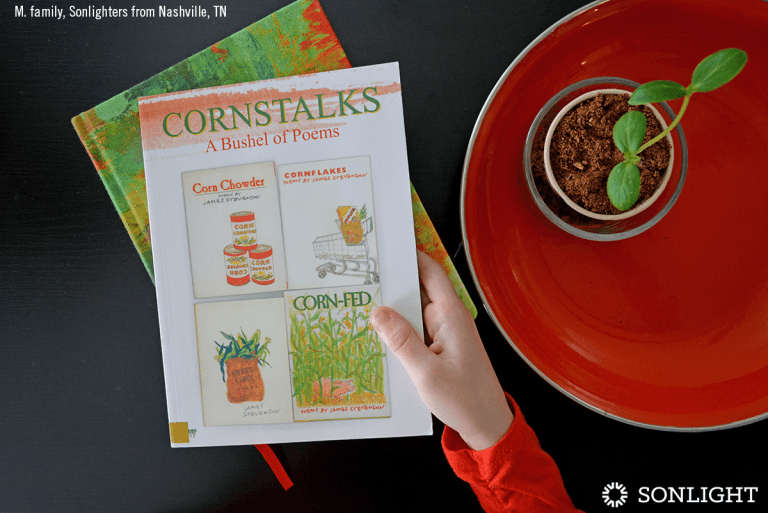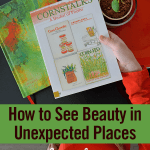
I am a lover of poetry. My daughter, on the other hand, is very literal. Her mind is scientific and pragmatic, and while she can—and does—memorize how to properly use idioms, she doesn’t have an intuitive sense for poetic language. When we worked through the (delightful!) Grade 2 Readers, I taught her how to systematically pause after each line break when reading the Surprises poems aloud. Struck by the mathematical cadence present in the rhymed couplets and verses, she declared she loved poetry.
Poetry Doesn’t Need to Rhyme
Surprises won a place of honor on the “books we’ll never sell” shelf, and we finished our Grade 2 Readers far, far ahead of schedule. But when we opened Cornstalks: A Bushel of Poems later (note, this title has been replaced with 104 Poems of Whimsy and Wisdom to Delight Children of All Ages), my daughter exclaimed, “This isn’t poetry! It doesn’t even rhyme!”
As I quickly explained, a poem is not the same as a rhyme. While some poetry does contain rhyming words, a poem is not defined by corresponding ending sounds—or lack thereof. Instead, I told her, poetry helps us see beauty which might not have occurred to us before.
Poetry Teaches Us to See Beauty in Unexpected Places
In the classic book Red Sails to Capri, the local innkeepers’ son Michele leads beauty-seeking artist Lord Derby on a steep hike up to a lookout point high on the Mediterranean island. After waiting for Lord Derby to reveal what he’d painted en plein air on the canvas, Michele gasps.
“There was no sea, no sky, no cliffs.
‘The steps,’ he gasped. ‘You painted a picture of the steps to Anacapri.’
Lord Derby nodded, well pleased with himself. ‘Do you like my picture?’
Michele nodded slowly. ‘Yes. Only—
‘Only what?’
…‘I never thought they were beautiful at all. I thought they were ugly.’
‘Perhaps you have never looked at them before.’
‘Looked at them? I have looked at them a thousand times.’
‘Sometimes we never see the things we look at the most often.’”
Cornstalks is a treasure because it enables us to see—to really see—ordinary things we look at all the time.
Poetry Nudges Us to Notice Small Details
What poet Laureate Billy Collins does for adults in his exquisite poem Litany, James Stevenson does for children in Cornstalks. In Litany—you’ve read this extraordinary work, right?—Billy Collins calls us to turn our eyes toward
- the bread,
- the white apron,
- the boots in the corner, and
- the “evening paper blowing down an alley”.
In Cornstalks, Stevenson invites us to celebrate
- the little decorative toothpick in the diner sandwich,
- the snow-covered used car lot,
- adhesives,
- paint, and
- backpacks.
I’ve heard fellow Sonlighters lament these topics make no sense, but I would argue the brilliance of these topics lies in the very fact they are ordinary. “Most children have probably observed a used car lot as they drive around town”, writes Amy Lykosh in the History / Bible / Literature C Instructor Guide’s introduction to Cornstalks.
As we continued to read through these poems, my daughter’s laughter grew louder and more frequent. She no longer cared which poems rhymed and which did not, and she began to delight Stevenson’s minute details. Teaching kids the worth of everyday situations—not just the vacations and mountain-top experiences—is incredibly powerful.
Poetry Teaches Us About Perspective
Poems, at their very core, allow us to see the world in new ways. You may be familiar with a popular illustration wherein two individuals are seated opposite one another, with a numeral on the table between them. “It’s a six!” one exclaims. “No, it’s a nine!” the other insists. Poet James Stevenson employs this same concept of perspective in many of his poems, demonstrating, in a light and humorous yet thought-provoking way,how the same object can express two very different meanings, depending on which way it’s viewed. These poems made my daughter laugh, but I also noticed she paused her reading, and looked around the room, her eyes thoughtfully resting on various everyday objects.
And isn’t it interesting how the skills of
- analytical thinking,
- problem-solving,
- repurposing,
- thinking outside the box, and
- viewing a situation from all angles
are being exercised through poetry, thought Cornstalks is about as far from a STEM subject as you can get?
Poetry Encourages Us to Practice Gratitude
Gratitude, I think, is the most precious of all the lessons we learned from Cornstalks. In our daily lives, it is easy to lament all we do not have, looking with frustration at
- the old kitchen counters,
- the faded car upholstery,
- the chipped mugs,
- the worn-out jeans,
- the tired trail worn in the carpeting, and
- the less than glamorous neighborhood view.
We may wish for more beautiful surroundings, or even a better system for taking out the trash. But poetry—especially poems centered around everyday occurrences—reminds us joy and beauty lies at least partly in our attitude. “[Garbage] bags sit on the sidewalk,” James Stevenson writes, “dressed in black, wearing bow ties, ready for the opera.”
While we can’t walk around with our head in the clouds all the time (life is very much lived in the gritty reality down here on earth), we can absolutely
- begin to practice the habit of gratitude,
- look for beauty, and
- give thanks for what we see.
Expressing thanks for simple objects like bags of trash may seem forced and awkward at first, but the practice of heaven-facing gratitude has the power to transform our entire outlook. When I complain about having to run to the corner store because I forgot an item on my grocery list, Cornstalks reminds me, “When I go to the drugstore and see how many ailments there are, I am grateful to be alive.” Poems like these drive home
- how much value there is in every last bit of drudgery,
- how much beauty is hidden in things we take for granted, and
- how very much I have to be thankful for.
And by the end of the book, my daughter had begun to write her own short poems of gratitude about everyday life. (Redemption lived out, in the everyday!)
‘Your ugly steps,” says Lord Derby in Red Sails to Capri, “if I have made you see a bit of beauty in them, Michele, I am happy.”
We all have ugly steps. Cornstalks helps me see the beauty in mine.
If you'd like your thinking stretched by books you might not choose on your own, consider Sonlight. Order a complimentary copy of your catalog today.









What a brilliant post, Gina! I’m headed upstairs to find our copy of Cornstalks right now! (We finished our 14-year homeschool journey in 2013, but we still have shelves and shelves of Sonlight books!)
Thank you, Michael Ann! Love that your shelves are still lined with Sonlight books :)